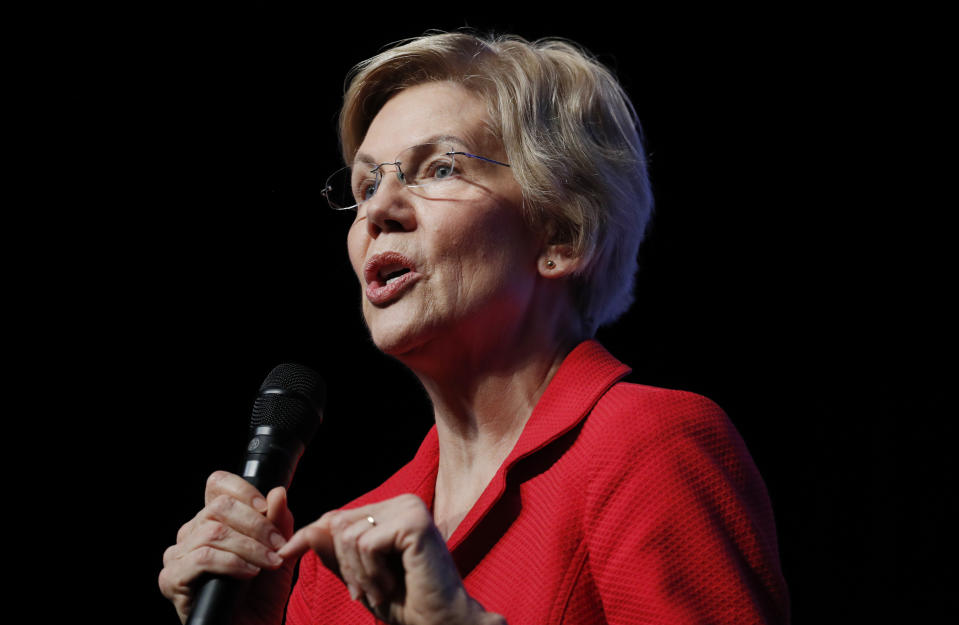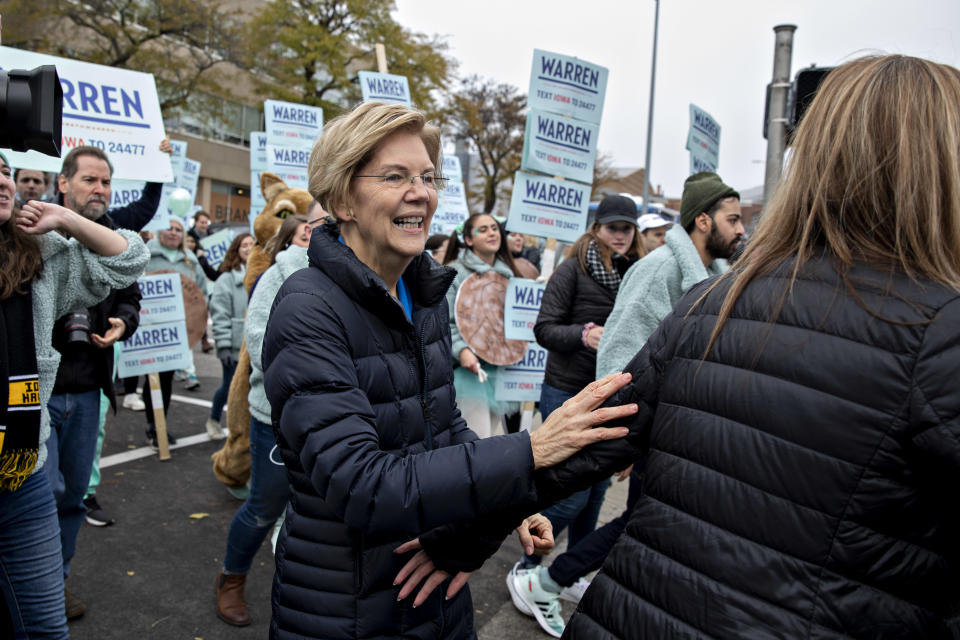Warren tries to escape shadow of Medicare for All as crucial debate looms

- Oops!Something went wrong.Please try again later.
Welcome to 2020 Vision, the Yahoo News column covering the presidential race with one key takeaway every weekday and a wrap-up each weekend. Reminder: There are 76 days until the Iowa caucuses and 350 days until the 2020 election.
Is Elizabeth Warren past her peak?
Reading all the hot takes online, you’d almost think so. On Oct. 8, Warren’s national polling average hit 27 percent. But her numbers have steadily declined from there, and on Monday they slipped below the 20 percent mark for the first time since September. In Iowa, where Warren led the field for months, she now trails Pete Buttigieg, who currently enjoys the support of 25 percent of likely caucus-goers, according to a new Des Moines Register/CNN poll — a 16-point surge from the consortium’s last Iowa poll in September. (Warren lost 6 points over the same period.) On Monday, the New York Times declared that “Moderates Are Seizing the Moment in the Democratic Primary” after months of letting “the most liberal candidates set the agenda,” while David Dayen of the American Prospect, a progressive magazine, accused Warren of shooting herself in the foot by “misread[ing] the politics of health care” by equivocating over Medicare for All, then embracing it, then struggling to explain how she would finance and implement it.
“This trajectory goes only one way,” Dayen wrote. “Back to being the senior senator from Massachusetts.”
And so with Wednesday’s Washington Post/MSNBC debate looming, and with the Iowa caucuses a mere two and a half months away, has the time come to downgrade Warren’s chances of winning the nomination?
The short answer is not quite yet. Going forward, Warren’s fate depends on whether she can put behind her the thing that’s been weighing her down for weeks now: her own awkward handling of Medicare for All. Her hope, now that she’s finally released her long-promised plans to transition to the program during her first term and finance it without raising middle-class taxes, is that there’s enough time before the caucuses for Democratic voters to forgive and forget the whole episode; that, in turn, would allow her to refocus on her preferred theme of Wall Street and Washington corruption and remind them why they liked her so much in the first place. The senator’s rivals, meanwhile, hope the damage is done.
Wednesday’s debate will be the first test of who’s right.
There’s no doubt that Medicare for All has wounded Warren. At first she tried to have it both ways, co-sponsoring Bernie Sanders’s 2017 Medicare for All Senate bill while also leaving wiggle room for other paths to universal coverage. “Everything should be on the table,” she wrote at the time. “Medicare for All is one way.” Then at the first Democratic debate, in June, Warren clarified that she was, in fact, “with Bernie on Medicare for All” — but she went on to spend the next few months dodging questions about whether she would raise middle-class taxes to pay for it. “Your signature, senator, is to have a plan for everything,” Buttigieg snapped at the October debate. “Except this.” Finally the pressure seemed to get to Warren, and on Nov. 1 and Nov. 15 she released plans of her own — which have won praise from wonks while doing nothing to stop the attacks from her opponents, who now accuse her (from the center) of fuzzy math and (from the left) of backtracking on her commitment to the cause.

Voters appear to have noticed — especially in Iowa, where they’re paying closer attention than anywhere else. The new Des Moines Register/CNN poll (which was conducted by the state’s best pollster, Ann Selzer) is revealing. Since Selzer’s September survey, Warren and former Vice President Joe Biden have both lost support amid Buttigieg’s rise, but Warren has lost more. Sanders has gained ground as well. One plausible explanation is that the segments of Warren’s base that overlap with Buttigieg’s and Sanders’s — white college-educated voters and very liberal voters, respectively — have both shifted away from her. Another warning sign: 38 percent of likely caucus-goers said Warren’s political views were “too liberal” (up from 23 percent in Selzer’s March poll), while only 48 percent said they were “about right” (down from 54 percent in March). For comparison, only 7 percent of Iowans said Buttigieg’s views were too liberal; 63 percent said they were just right. Warren’s unfavorable rating has increased to 25 percent as well — a jump of 8 percentage points since September.
If the Des Moines Register/CNN results hold and Warren finishes behind Buttigieg in Iowa, it will be very hard for her campaign to recover; the caucuses are tailor-made for her, with their liberal, white, well-educated participants, and expectations are high because she was leading in the polls for so long. But Warren still has room to maneuver. Her favorable rating in Iowa still hovers above 70 percent, and she is the second choice of a larger share of likely caucus-goers than anyone else. Add in her first-choice supporters and the Iowans who say they are “actively considering” her, and Warren is statistically tied with Buttigieg for the largest “footprint” in the field — that is, the largest pool of actual and potential supporters. Both Biden and Sanders trail by about 10 percentage points. Two months before the 2004 Iowa caucuses, John Kerry, the eventual winner and Democratic nominee, was 14 points behind Howard Dean in the polls; four years later, Barack Obama was 7 points behind Hillary Clinton. There’s plenty of time for Warren to come back.

Which brings us back to Wednesday’s debate. When it comes to health care — the subject that has dominated the first hour of every one of these events — Warren has said pretty much everything she wants to say, and there’s nothing she really can say to transform the issue into a winner at this point. So the less she has to talk about Medicare for All, the better. Her plans are public; her position is known. If health care again takes center stage — and if Biden, Buttigieg, Amy Klobuchar and others continue to gang up on Warren — that will be a sign of what’s in store for her over the next two and a half months. But if Biden and others instead train their frontrunner fire on the ascendant Buttigieg, and if Medicare for All starts to fade as an issue, then that could mean the worst is behind her.
The question now is whether Warren can close the door on Medicare for All — or whether it has already defined her. Her campaign hangs in the balance.
_____
Download the Yahoo News app to customize your experience.
Read more from Yahoo News:
Rebuilding Paradise: A year after the Camp Fire, one couple finds healing in starting over
Key Democrat: House needs to 'keep this simple' in crafting impeachment articles
As Supreme Court weighs DACA, Trump pushes fiction about 'hardened criminals'
PHOTOS: 10 bronze statues of inspirational women in NYC by Statues for Equality"





